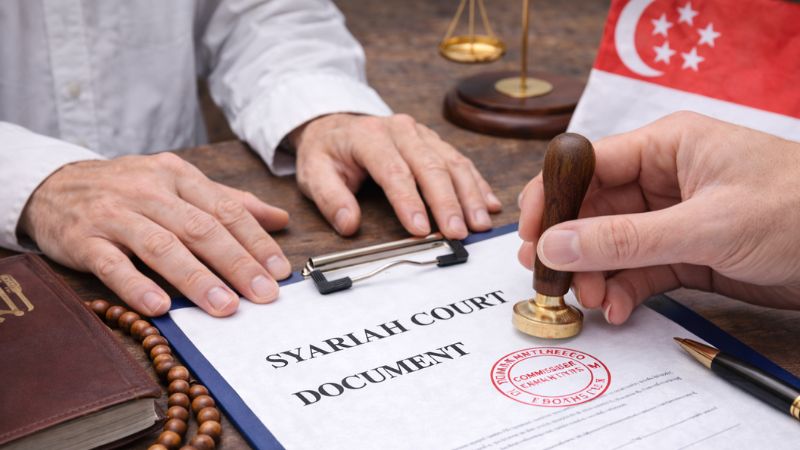When you start court proceedings in the Syariah Court in Singapore, either for divorce, inheritance, or other family matters, at some point you will need to see a Muslim Commissioner for Oaths (CFO). While you can fill in and file applications and documents through the Syariah Court Portal online, you will need to submit evidence in the form of affidavits and a statutory declaration affirmed before a Commissioner for Oaths.
Below, we explain the Syariah Court affidavits and statutory declarations, and discuss when you will need CFO services for the Syariah Court.
Key Takeaways
- Proceedings in the Syariah Court of Singapore require filing evidence in the form of affidavits and statutory declarations.
- According to the rules of the Syariah Court and statutory requirements, the affidavits and statutory declarations must be affirmed before a Commissioner for Oaths.
- Instead of swearing an oath, Muslims can affirm an affidavit or a statutory declaration with the same legal effect.
Who Is a Commissioner for Oaths?
A Muslim Commissioner for Oaths (CFO) may be a lawyer, court interpreter, or government official appointed by the Board of Commissioners for Oaths and Notaries Public in Singapore.
At the same time, only those Commissioners for Oaths who are lawyers are competent to take affidavits, affirmations, or statutory declarations for the Syariah Court. Generally, non-lawyer CFOs’ role is limited to handling documents relevant to their organisations.
A lawyer appointed as a Commissioner for Oaths must be at least 35 years old and have at least 10 years of legal practice.
Why Syariah Court Documents Must Be Signed Before a Commissioner for Oaths?
In Singapore, the law requires Syariah Court affidavits and other documents to be signed before a Commissioner for Oaths. The role of the CFO is to verify your identity and affirm the authenticity and legal validity of statements and declarations in these documents.
When you sign a document before a Commissioner for Oaths, the Commissioner will explain the consequences of making false statements and act as the official witness of the signing.
What Are Syariah Court Documents That Need a CFO?
In Syariah Court proceedings, Muslims need to file affidavits and make statutory declarations as required by the court process. When affirming affidavits, Muslims, for whom oaths are not binding, may substitute the words “solemnly, sincerely and truly declare and affirm” for the word “swear” and omit the words “So help me God.”
Affidavit of Divorce
In Singapore, Muslim spouses apply for divorce in the Syariah Courts by filling in the required forms on the SYC Portal, which is followed by pre-mediation sessions. If pre-mediation does not result in reconciliation, the spouses file an affidavit of divorce during the pre-trial conference as directed by the Court. In the affidavit of divorce, the spouses make sworn or affirmed statements about the grounds of divorce before the Commissioner for Oaths.
Affidavit for Nafkah (Financial Maintenance)
In Muslim divorce, nafkah iddah is the financial support the ex-husband provides to his wife during the iddah period. The divorcing spouse typically files the affidavit for nafkah together with the affidavit for divorce during the pre-trial conferences, as directed by the court. The affidavit for nafkah needs to be affirmed before a Muslim Commissioner for Oaths.
Affidavit for Guardianship
If the divorcing Muslim spouses have minor children, they need to outline any claims for guardianship or custody in the Affidavit for Guardianship. Generally, such an affidavit should include details about the child’s living arrangements, education, and welfare. Similar to other Syariah Court affidavits for divorce, the spouses can file an affidavit for guardianship during or after the pre-trial conferences, as directed by the court.
Statutory Declarations
Unlike affidavits, which typically serve as evidence in contested proceedings, statutory declarations declare facts or confirm information requested by the court, for example, the identity of an applicant or the beneficiary status. Similar to Syariah Court affidavits, Muslims need to affirm their statutory declarations before a Commissioner for Oaths.
For example, when a beneficiary under Faraid applies for a Faraid (Inheritance) Certificate to the Syariah Court, the beneficiary needs to demonstrate their relationship to the deceased. To do so, the beneficiary files supporting documents through the SYC Portal along with a statutory declaration, affirmed before a Commissioner for Oaths.
How IRB Law Can Help
When you initiate proceedings in the Syariah Court, you might need to file an affidavit or a statutory declaration affirmed before a Commissioner for Oaths.
IRB Law’s legal team in Singapore is authorised as Commissioners for Oaths and well-versed in Syariah Court requirements for affidavits and statutory declarations. Our Muslim Commissioners for Oaths can provide efficient and professional service to enable you:
- Follow the Syariah Court requirements for affidavits and statutory declarations,
- Prepare and file statutory declarations according to the procedure,
- Affirm the authenticity and legal validity of your affidavits or statutory declarations for use in court.
Conclusion
When you file evidence with the Syariah Court in the form of affidavits or statutory declarations, you need these documents to be affirmed before a Commissioner for Oaths. As a Muslim, you can affirm the affidavits and statutory declarations instead of taking an oath. For more information, or if you seek professional and efficient CFO services for the Syariah Court in Singapore, please don’t hesitate to contact IRB Law Commissioners for Oaths.
FAQs
Do I need to see a Commissioner for Oaths for the Syariah Court divorce process?
When you apply for divorce to the Syariah Court in Singapore, you will need to provide evidence in the form of affidavits and statutory declarations during or after the pre-mediation sessions, at the court’s discretion. According to the rules of the Syariah Court and statutory regulations, you will need to affirm affidavits and statutory statements before the Commissioner for Oaths.
Does a Commissioner for Oaths explain the contents of my documents to me?
The role of the Commissioner for Oaths is limited to verifying your identity and ensuring that you understand the consequences of making false statements under the Oaths Act. You are responsible for the accuracy and truthfulness of any statement you make in the affidavits or the statutory declarations.
Is remote oath administration allowed for Syariah Court documents in Singapore?
Yes, according to the amendments to the Muslim Marriage and Divorce Rules, you can affirm and sign an affidavit before a Commissioner for Oaths through live video or live television link.
Do I need a Notary Public or Commissioner for Oaths for Syariah Court documents in Singapore?
When you apply for divorce with the Syariah Court in Singapore, you will need to file affidavits and make statutory declarations, affirmed before a Commissioner for Oaths.




